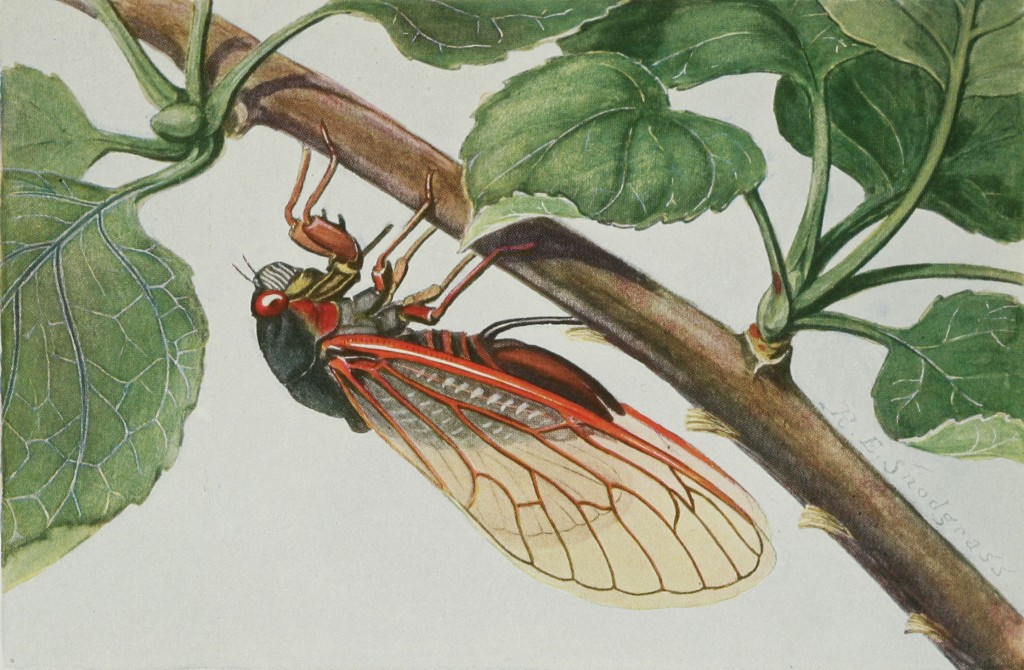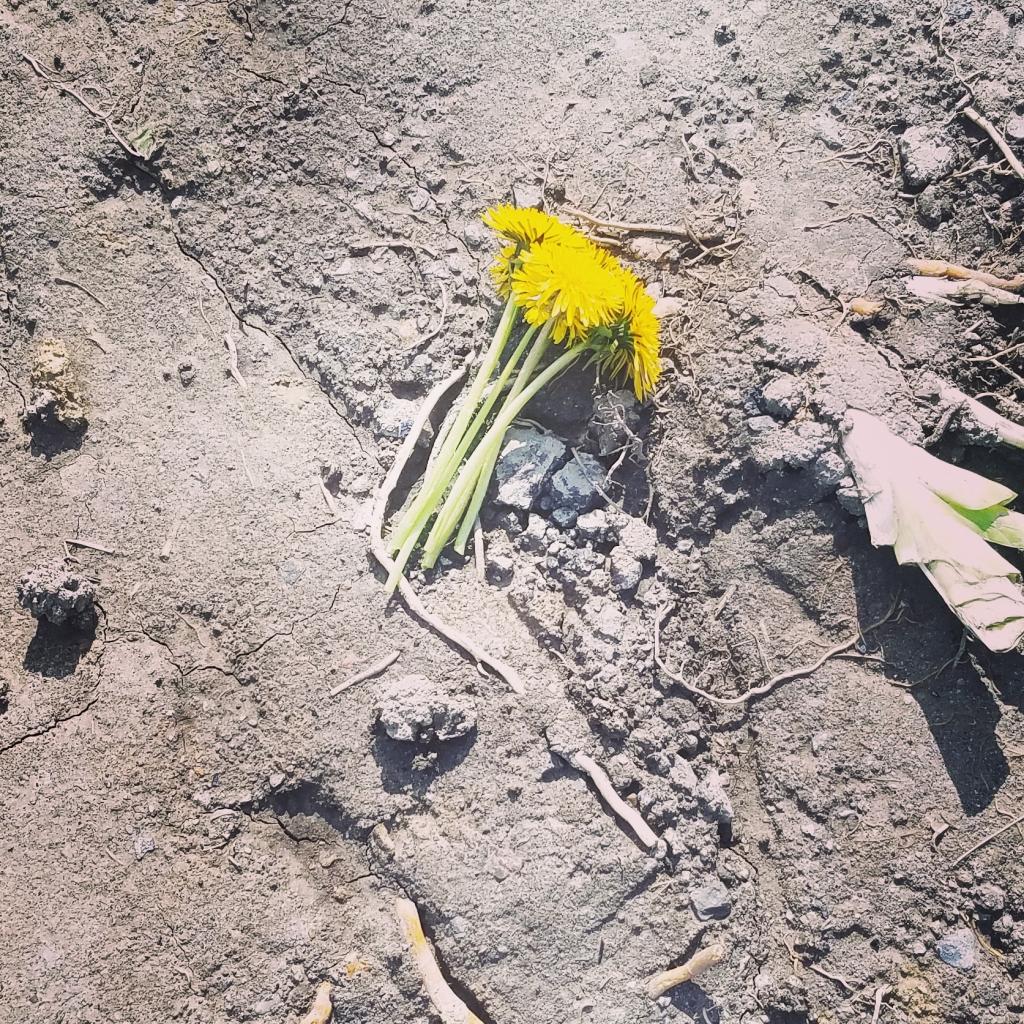“The story is that once upon a time these creatures were men–men of an age before there were any Muses–and that when the latter came into the world, and music made its appearance, some of the people of those days were so thrilled with pleasure that they went on singing, and quite forgot to eat and drink until they actually died without noticing it. From them in due course sprang the race of cicadas, to which the Muses have granted the boon of needing no sustenance right from their birth, but of singing from the very first, without food or drink, until the day of their death…”
So Plato, in the Phaedrus, tells the myth of the cicadas. This is not the only myth in which they appear: another story has it that old Tithonus, the lover of Dawn, granted immortality but not enduring youth, was changed eventually into a cicada: better off than the Cumaean Sybil, disintegrating in her jar. They appear in poems, haikus, tales, and fables, from Chinese and Japanese and French traditions. In some versions of the fable of the grasshopper and the ant, a cicada takes the place of the grasshopper: an artist, a singer, one who lives for the moment, improvident.
Cicadas in natural history first appeared nearly 300 million years ago, in the Permian period; during the Jurassic period came the giant cicadas, nearly three inches long, now extinct. At least 1300 kinds of cicadas are found worldwide, but the periodical cicada, also known as the magicicada, with its distinctive round red eyes, is found only in the eastern region of North America.
Every seventeen years, the cicadas of Brood V appear here in Ohio, sluggishly creeping up from the earth when it warms in spring, perching tentatively on walls and branches, unfurling slowly, pale and diaphanous, from golden brown shells, then resting as their exoskeleton darkens and hardens. Anywhere you look, you will see one – or ten – or a hundred.
They have slept deep in the earth, as deep as six feet, sipping the sap from tree roots, and now their brief time of activity begins. The males, slightly smaller than the females, gather in groups to sing their mating-song, which is produced not by stridulation, but by vibrating their drum-like timbals; when a female responds with distinctive wing-movements, the male then sing a special courtship song addressed to her alone. The females then lay their eggs in the small branches of trees, sometimes causing damage.
Their time to sing, to soar, and to find a mate is brief. For several weeks the skies are full of the cicada song, then they die, and their corpses litter the ground, crunching underfoot. The larvae emerge from the eggs in branches, and burrow down into the earth to sleep as nymphs for another seventeen years.
In preparation for the coming of the cicadas, I have wrapped all my young apple trees in diaphanous gauze, so they sway like ghosts on the hillside. I dread damage to my trees, but I love the cicadas, and their song, and do not hold against them their feasts, for their time to live intensely is so brief.
When last I saw the magicicadas and their red eyes, it was 1999; I was twenty-five, just finishing my doctoral work in Literature, drafting a dissertation on James Joyce’s Ulysses. Everything was going well; I had presented papers at several conferences, with special attention to Plato’s dialogues as literature, and to the rhetoric of seduction in the Phaedrus. How learned I was in the aesthetic of living intensely, in my scholarly work, and in life, drinking until dawn, writing poems about the Maenads, squandering my gift of adoring and being adored. That was the summer we built the outhouse, and covered it with vulgar quoations: caca cotidie, et declina medicos. Hypotheses no finge, in ventum non minge. That was the summer we made our literary pilgrimage to Flannery O’Connor’s childhood home in Savannah, and to Andalusia, where we couldn’t get in for fear of being shot by an irascible cousin, nor purchase whiskey to pour libations at O’Connor’s grave, since the county turned out to be dry, though the men in the barbershop surreptitiously hid brown bags beneath their chairs, when we went in to ask for directions.
That was the last year, I think, in which I was able to think well of myself and look forward to a glorious future. Everything changed. Outraged at the divine, I decided I was tired of being good, and would begin to be bad. How can I regret that, though, the years spent underground, a sightless nymph struggling towards unseen light, sipping the sap of survival? Because the apocalypse that was granted me was this: that I never had been good, that all my dreams of goodness were shadows in a small cave, my desires golden fetters. I should have known that anyway. I knew my Plato.
At the same time I learned that which I also should have learned from Plato: the light of the good shines on all. It could be translated “the beautiful” as well. Sing of this, muses.
The cicadas are here again, and I look forward to their song, hoping that they might bear me some message, something I missed seventeen years ago, when I had not yet learned to listen well. Time is different for them; time is different for everything, a series of waves or rivulets, and if I can leap into the right one, in the right river, I might find that past isn’t really past, after all. Can I redo everything? There are moments that might have endured, moments I can touch with the delicacy of a calloused finger on an insect’s diaphanous wing, the hesitancy of a cigarette flare in the twilight, the smooth certainty of a rifle’s trigger.
The cicadas are here again, and no, I can’t. They are not here to bring me this message. They are not here to serve me, but to live their brief lives. Here is the mystery, that we know so much, but cannot guess at the secret inner lives of the beings with whom we share the earth, not only cats and horses, but vultures and spiders and toads and insects. What do the cicadas see through those red eyes, how do they celebrate their brief loves, how move towards death? Their story is not the story of men – or women – who were overcome with beauty and sang until they died. That is our story, our way of finding a connection with the creatures that live and move apart from us, because we must have this connection, we must find that all things fall together into some pattern, though it may be hidden from us now.
Still – all the universe may be reflected in a hazelnut; an insect is a bottle with a message in it, a story of all that is, if we could read it right.
In a month or so I will unwrap my trees, and see what has survived.
Sin is behovely, but all shall be well, and all shall be well, and all manner of thing shall be well.
image credit: https://en.wikipedia.org/wiki/Periodical_cicadas#/media/File:Snodgrass_Magicicada_septendecim.jpg. Public domain













